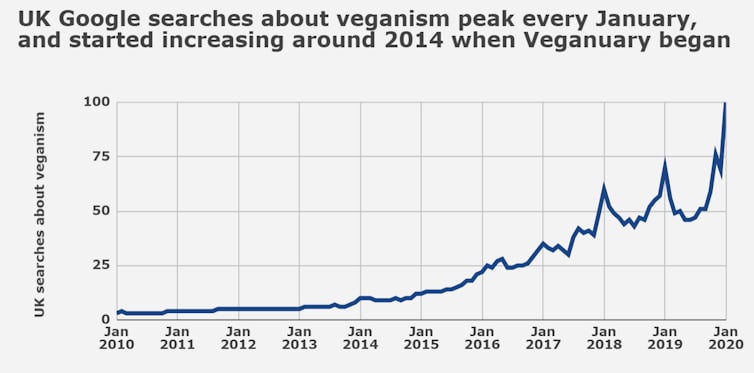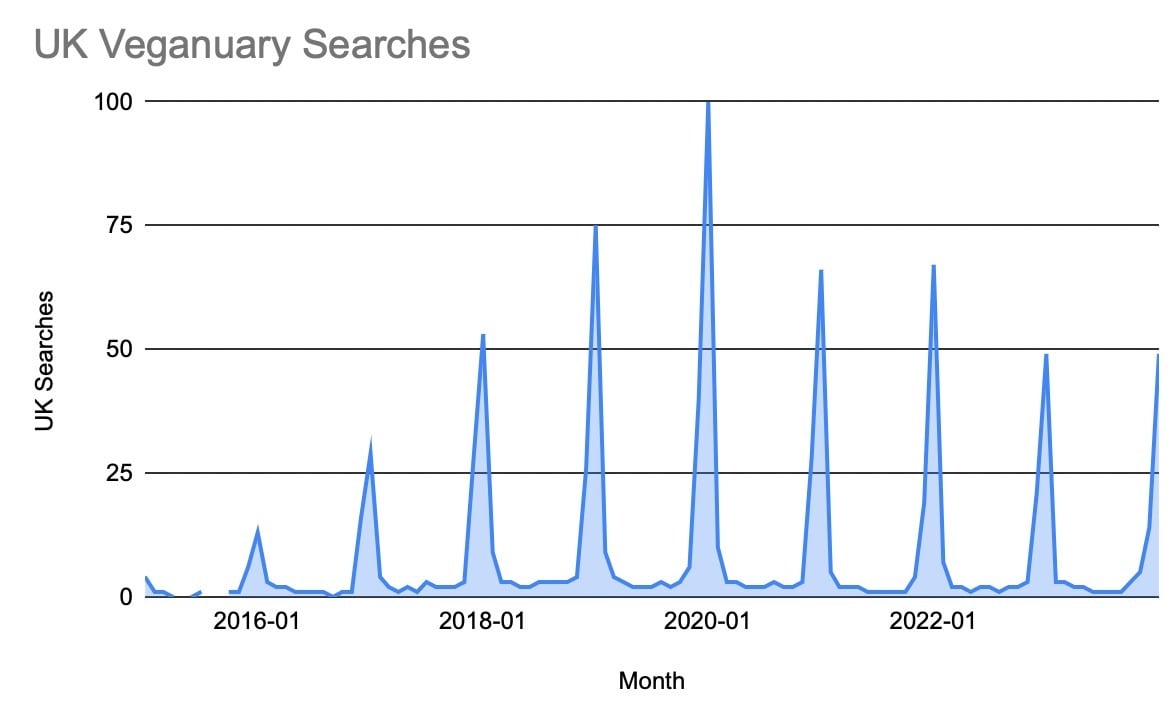For people short on time (like me), I’ll point out this article brief, highly skimmable, and full of self-explanatory graphs. It also briefly explains reasons the researchers think Veganuary succeeds where similar efforts have failed (i.e., the time of year and social experience).
At first glance, the evidence presented here seems quite impressive for near-term reductions in animal product consumption. However, it may not be as impactful as it initially seems (see the comments on this post).
To the extent that it is effective, I’m unsure whether it indicates significant moral circle expansion because many participants may already include farmed animals in their moral circle, meaning they aren’t expanding their moral circle, but instead accepting the implications of their moral circle (which may be a distinction without a difference, as both produce equally-good long-term consequences).

I think this is pretty bad news, actually.
Here we have an intervention that apparently increases sales of plant-based products by 57% and yet does not decrease sales of meat products at all. Unfortunately, this corroborates a growing body of evidence suggesting that plant-based products often fail to displace meat products, even when they gain their own (orthogonal) market share.
As an aside, even with the effects on plant-based products, it's also hard to attribute causation to Veganuary specifically, since it always occurs during a month that we know is associated with unusual recurring "shocks" (e.g., the end of holiday dinner parties; the beginning of New Year's resolutions).
I wonder if the effect is just too small to detect through the noise and other trends and shocks in animal product consumption, but it still exists and is still big in absolute terms for animals.
1.3 million people in Great Britain going vegan for the first time in January 2019 (source1, source2) out of 65 million people living in Great Britain is only about 2% of the population of Great Britain,[1] so we'd expect at most a 2% negative demand shift on meat purchses. Those going vegan were also probably eating less meat on average, so 2% would be an overestimate. And then you also have to adjust for elasticities, so the actual effect on meat production or sales would probably be <1%. That could be hard to detect, depending on how large differences in meat sales year-over-year and December to January typically are.
On the other hand, they report 1.31 million as 4.7% of the total GB adult population, but this seems wrong to me:
This would imply a GB adult population of 1.31 million / 0.047 = 27.9 million. But there were fewer than 16 million people under 18 in the UK in 2023 so GB should have an adult population of at least around 65 million (all GB) - 16 million (UK non-adults) = 49 million. I don't see how they got 4.7%.
Hi Maya,
Would you be more enthusiatic about interventions pushing for the replacement of poultry meat by plant-based foods, as One Step for Animals does[1]?
They focus on broilers, not poultry more broadly, but I think a broader focus would be useful to mitigate replacements of chicken meat by other poultry meat.
Where are you getting that it didn't decrease meat sales? I see nothing in the article pointing to that and they also point out that aggregate meat sales have been calling.
I would be extremely skeptical that vegan consumption could go up a lot without meat consumption going down, since that would imply people are just consuming a lot more food in aggregate compared to previous years, which seems unlikely.
There's this in the abstract:
"Average weekly unit sales of plant-based products increased significantly (57 %) during the intervention period (incidence rate ratio (IRR) 1·52 (95 % CI1·51, 1·55)). Plant-based product sales decreased post-intervention but remained 15 % higher than pre-intervention (IRR 1·13 (95 % CI 1·12, 1·14)). There was no significant change in meat sales according to time period. The increase in plant-based product sales was greatest at superstores (58 %), especially those located in below average affluence areas (64 %)."
From the main body of the text: "Plant-based products represented 0·011 % of product unit sales in the pre-intervention period. This increased to 0·016 % during the intervention period and 0·012 % in the post-intervention period. Meat products represented 26·52 % of sales in the pre-intervention period, 26·51 % during the intervention period and 26·32 % in the post-intervention period. The remainder of sales were represented by non-meat products (73·47 % in pre-intervention and intervention periods, 73·67 % in the post-intervention period)."
One thing to flag on reading into this as evidence against plant-based sales leading to lower meat consumption is how much harder it will be to detect a significant effect on meat consumption. The background variation on those is much higher so to detect a significant effect from a campaign like Veganuary we would need a much larger total effect size. Even if the 0.05% of pre/post change in plant-based came 100% from meat I'd expect it still would not be significant.
This can still be a counterfactual decrease in meat sales right?
Agreed, though if their model isn't correctly specified to identify the causal effect on meat (which I agree is tough here), then presumably the effects on plant-based sales would also be suspect.
Interesting, then I figure it probably substituted for meat consumption at restaurants rather than meat consumption at home. Regardless, I think it's mostly valid to use increase in plant based consumption as a proxy for a reduction in meat consumption since total food consumption is relatively stable.
@Karthik Tadepalli see my comment below:
However, we do have to consider that meat consumption is increasing and plant-based product sales are decreasing in most countries. So it is still very possible that Veganuary guarded against even worse outcomes in the UK.
Thank you for your investigation.
That is disappointing...
However, there's still at least some benefit from increased plant-based product sales by providing revenue to plant-based companies for R&D and other expenses.
Yes, good point
Hey thanks for sharing this. This is quite impressive results from Veganuary.
My only criticism is that the article, despite being published in 2024, seems to leave out important context. For example, UK vegan product sales (where Veganuary is most active) went down overall in 2023. This article from Nov 2023 highlights this fact and attempts to reconcile them in the context of outside economic forces. The article also doesn't mention that per capita meat consumption has been rising in the UK. Is there a reason why these details were left out of the article? They seem like important context to include.
Unfortunately, I'm learning the article may be a bit misleading. I'd see some of the other comments for more details.
There is the following graph in the article:


I think supplementing it with the following graph provides important context. It should be noted that January 2024 data is incomplete.
Also, this January spiking pattern had been most clear and pronounced in the UK, where Veganuary has been most active (from the Economist):
Good point. This does provide a bit more evidence that it's not just due to other January shocks that were happening regularly before Veganuary started.
Unfortunately, it also shows its impact has been decreasing since 2020 (which the first graph doesn't show).
Yeah I'm surprised this evidence was easily available, but not included in the article. Very interesting. I have tagged the author in a thread about this article on the Impactful Animal Advocacy Slack so I will report back anything he has to say on the matter.
FWIW I do have a lot of respect for the author and this is the first time I've found myself puzzled about his output.
Thanks for doing that! I'd love to hear what he has to say.
@Nicholas Kruus this is what the author, Chris Bryant, had to say:
Here is the link to the full Slack thread. If you are not a part of the Impactful Animal Advocacy Slack, you can join here.
Thanks for sharing, Nicholas. For reference:
Thanks for sharing!
Personal highlight: "When Veganuary asked participants about their number one motivation for taking part, 18% said the environment, and 21% said their health – but 40% said animal welfare." I think I would have estimated something more like 25% animal welfare.
That finding pleasantly surprised me too! Though, I want to keep in mind that this is just one survey.
Yeah I was guessing more like 40:35:15:10 environment:health:welfare:other for UK in general, but that Veganuary had probably been pushing more welfare-heavy messaging so were getting a higher proportion of welfare folks, but still didn't expect twice environment/health :)
This was cool, thanks for sharing this. The evidence was stronger than what I was expecting.